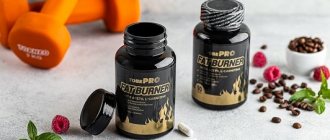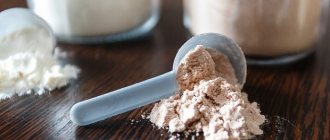How often do you hear the words “isotonic” or “energy gel” when talking to your coach or just a sports buddy? We're sure quite often. However, not all people, even those who train on a regular basis, fully understand what lies behind these common concepts and what the differences between them are. Today we will try to lift the veil of secrecy and tell you how to choose the right type of sports nutrition depending on your individual training format. As an example, we will look at energy gels from the most popular brand SiS (Science in Sport).
What is isotonic energy gel?
Energy gel is a type of sports nutrition that allows you to quickly and effectively consume liquid carbohydrates and provide the body with additional energy, which is necessary for any athlete during long-term stress and intense training. Such gels come in a variety of types, differing in structure, taste and, sometimes, composition.
The isotonic structure, which, in particular, is a distinctive feature of SiS energy gels, represents a special concentration of dissolved particles: in such a gel it is completely identical to the indicators of liquids in the cells of the human body. Due to this, there is no need for additional intake of water or other liquid, since all components of the isotonic gel are absorbed by the athlete’s body as quickly as possible, effectively being absorbed through the walls of the stomach.
Types of isotonics
Isotonic can be in several forms:
- ready-to-drink drinks. Manufacturers produce ready-to-use isotonic drinks in convenient bottles;
- tablets or powder. To prepare, they need to be diluted in water according to the instructions. This option is convenient for long workouts with large amounts of fluid consumed. In this case, you need to find convenient thermal tanks in our catalog, where you can buy sports water bottles of the required volume and prepare the drink yourself according to the instructions.
- Most ready-made drinks presented in stores are quite high in calories due to the large amount of fast carbohydrates they contain. This should be taken into account when consumed while losing weight, since sugar can slow down the process of losing extra pounds. In specialized sports stores you can find isotonic drinks for weight loss, which contain fewer carbohydrates and contain substances that make it easier to tolerate intense exercise.
To gain muscle mass, on the contrary, manufacturers offer drinks high in carbohydrates, additionally enriched with caffeine, BCAAs and other excipients.
What do they have in common?
If we talk about SiS energy gels, they have several varieties recommended for various types of training activity. This is determined by the presence of additional components in the composition, but what is common to all of them is a volume of 60 ml, the content of 22 g of carbohydrates in each serving, as well as the isotonic consistency already described above, which does not require the consumption of additional liquid to use the gel.
It is worth noting that the main source of carbohydrates in any of these gels is the substance maltodextrin: it has a certain molecular weight that ensures an effective supply of energy to the body without causing a sharp glycemic load.
Isotonic composition
The benefits of an isotonic drink directly depend on its composition. In general, the concentration of ingredients in the drink is as close as possible to the proportions of elements contained in the body. This makes the isotonic drink quickly and easily digestible. The composition usually contains:
- Carbohydrates: dextrose, maltose, ribose, glucose. They are represented by simple sugars in an amount of 5-8%. Carbohydrates replenish the body's energy reserves.
- Minerals: magnesium, chlorine, calcium and potassium. Create conditions for normal functioning of the body.
- Vitamins and minerals. Additional components that increase the benefits of isotonic.
We advise you to study: “What are the benefits of magnesium for athletes.”
There are also isotonic drinks without sugar, recommended for use during a strict diet for the purpose of losing weight. Using a glucose-containing drink makes a low-carb diet pointless. Here only the effect of replenishing electrolytes is observed. It is important to consider here that due to the lack of sugar, the effect will be different - you will not feel a surge of strength.
What types of gels are there and how to choose the right one for a specific type of workout?
There are 3 main variations of isotonic energy gels from the SiS brand:
- Classic (without additional components)
- With electrolytes
- Caffeinated
We recommend consulting with a qualified sports nutritionist before introducing isotonic gels into your regular sports diet: this determines not only the effectiveness of their use in terms of sports performance, but also their effect on the body in terms of possible individual metabolic characteristics.
However, below we will try to tell you in general terms about the differences between these 3 types of SiS energy isotonic gels.
Isotonic: what is it for?
Isotonic drinks are needed to maintain fluid and electrolyte balance in the body. They contain the required concentration of substances for rapid absorption in the body. Therefore, they quench thirst more effectively than ordinary water.
During exercise, the body loses moisture and minerals through sweat, mainly sodium and potassium. The lack of these substances impairs performance and can harm health. For normal functioning of the body, the sodium concentration in the blood should be about 135 mmol/l. By losing water through sweat, the body gets rid of excess salts in order to maintain the desired concentration in the blood. If you drink only water during a long exercise, the concentration of salts will decrease and a dangerous condition of hyponatremia will arise - a lack of sodium and other minerals. This condition is dangerous to health.
Source: dailymail.co.uk
SiS Go Isotonic Energy Gel
This is a classic isotonic gel that does not contain any additional components. It represents the main source of additional energy, recommended for use during any type of aerobic exercise. As mentioned earlier, each serving of this gel contains 22 g of easily digestible carbohydrates and does not overload the body’s digestive system.
SiS Go Isotonic Energy Gel (170 rubles)
How to use it with maximum efficiency? If your workout does not exceed 90 minutes, or if you are planning high-intensity interval training, it is recommended to consume 1 serving of the gel approximately 15 minutes before the start of physical activity. If you exercise for a long time (more than 90 minutes) or participate in endurance events (such as open water swimming or triathlon), you should consume 1 serving of the gel approximately every 30-40 minutes of activity.
Who needs isotonics?
Isotonics are needed in the following cases:
- When completing marathons;
- When running medium and long distances;
- During long walking (hiking, Nordic walking, hiking);
- In bodybuilding, fitness, crossfit - to prevent dehydration, loss of electrolytes and other useful substances. To maintain performance;
- In martial arts and cyclic sports.
Also, a portion of the drink will always be useful during any type of activity that causes sweating.
SiS Go Energy + Electrolyte Gel
This variety, in addition to the standard 22 g of carbohydrates, contains a complex of electrolytes that allow you to effectively maintain water-salt balance in the body. When is this especially necessary? During high-performance loads, especially in hot weather, the athlete loses a significant amount of fluid along with sweat, and along with it, mineral salts. The consequence of this loss of electrolytes can be a noticeable decrease in performance and even muscle cramps.
SiS Go Energy + Electrolyte Gel (210 rubles)
To replenish energy during intense training and long-distance competitions, it is recommended to use this gel, also 1 serving every 30-40 minutes of activity. In addition, it can be alternated with a classic carbohydrate gel.
What is so important contained in isotonic drinks?
Of course, the most important element of an isotonic drink is water. Firstly, our body is 60% water. Secondly, the loss of already 2% of fluid in hot weather (more than 30° C) leads to a decrease in performance. Further loss of water from the body can lead to cramps, heat stroke and other adverse effects.
Also, prolonged exercise leads to the depletion of glycogen in the muscles and liver and a drop in blood sugar levels. Therefore, isotonic drinks contain fast carbohydrates that are well absorbed by the body even during a race or race. An additional intake of 30-60 grams of carbohydrates per hour is considered optimal.
With prolonged exercise through sweat, we lose important minerals and trace elements, primarily salts. Therefore, the isotonic drink contains sodium. A decrease in sodium concentration in the blood leads to hyponatremia. In mild form, hyponatremia can lead to decreased brain activity, headaches, nausea and loss of coordination, and in severe form, it can lead to seizures and even coma. It is especially important to monitor blood sodium concentrations for marathon runners and athletes competing for more than 2 hours:
- For competitions lasting 2-3 hours, it is recommended to consume 0.5-0.7 g of sodium per liter of liquid.
- For ultra-distance - 0.7-1.2 g of sodium per liter.
Sodium also aids in the absorption of nutrients in the intestines and supports cognitive function, nerve transmission and muscle contraction, making it vital for athletes.
Other key minerals that an isotonic drink should contain include magnesium, potassium and calcium.
Potassium participates in the regulation of blood flow and prevents cramps; its deficiency leads to increased fatigue, which is especially critical at a distance. The mineral also regulates fluid balance in the body and facilitates the transmission of nerve impulses in the muscles.
Magnesium is essential for muscle relaxation and prevents cramps during prolonged exercise. The mineral is found in intracellular fluid and is involved in more than 300 biochemical reactions of the body. Magnesium is rich in leafy vegetables (especially dark greens), fruits, nuts and whole grains.
Calcium is more important in the daily diet for bone health, since its loss through sweat is not critical. It is recommended for an adult to consume 1-1.2 g of calcium per day.
With a proper and balanced diet, athletes should not experience any additional need for vitamins, so the full package of all groups A, B, C, D, etc. on the isotonic drink label is nothing more than a marketing ploy. Their concentration will not be significant and will not bring much benefit. First of all, pay attention to the concentration of carbohydrates and salts that is optimal specifically for your needs.
SiS Go Energy + Caffeine Gel
The formula of this type of isotonic gel from SiS contains additional caffeine: it stimulates the central nervous system (CNS), thereby increasing concentration and reaction speed, which can decrease under the influence of intense exercise. In addition to this, a mixture of liquid carbohydrates and caffeine partially eliminates the feeling of fatigue.
SiS Go Energy + Caffeine Gel (220 rubles)
Energy gel with added caffeine is recommended to be used in 1 serving 15-30 minutes before the start of a workout not exceeding 90 minutes in duration. However, the main focus of SiS Go Energy + Caffeine Gel is marathon distances: it would be better to use it at the final stages (for example, after the 30th km), when the body requires additional quick recharging. Please note that caffeine may have individual contraindications and individual absorption characteristics, so in this case it is especially important to consult with a qualified sports nutritionist in advance.
How and when to drink isotonic drinks
It is important to understand when and how to drink isotonic water. If used uncontrolled, it will not only not provide any benefit, but can also lead to negative consequences in the long term.
The first rule is that isotonic drinks should be used only during physical activity. If used at other times, even top isotonic drinks will be no more beneficial than any juice or sweet drink. Isotonics are especially needed in the warm season, when profuse sweating occurs. Also, such drinks are well suited for long walks, hiking trips, and any long-term exercise.
Start drinking an isotonic drink 10-20 minutes before physical activity. This will provide the necessary hydration and improve physical performance. Most of the drink should be drunk during exercise. For example, in fitness, it is best to take a few sips between sets or drink a small drink between exercises. You can also drink an isotonic drink after exercise, but in this case its benefits will not be as pronounced. In fact, after exercise, the isotonic drink can be easily replaced with any fitness bar (especially salty-sweet ones) and plain water.
Using drinks at any other time to simply quench your thirst does not make sense and only leads to increased financial expenses. There is no harm in isotonic drinks, but abuse can lead to increased salt intake, the formation of kidney stones and other consequences.
What does the body need vitamin K for?
- Necessary for proper absorption of calcium.
Vitamin K regulates the activity of special proteins - matrix Gla protein (MGP) and osteocalcin. Thanks to the first protein, calcium, which we receive from food or from dietary supplements, is not deposited in the blood vessels, but is directed towards building bone tissue. Meanwhile, the second protein, osteocalcin, binds calcium in the bones and thereby helps maintain their density. By the way, vitamin K2 is a more powerful regulator of calcium metabolism compared to K1. - Helps maintain vascular and heart health.
This effect is a consequence of the previous one. If calcium is not absorbed correctly, it can be deposited in the vascular walls, on atherosclerotic plaques. The results of a number of studies confirm that taking vitamin K2 prevents this process and reduces the risk of developing coronary heart disease. - Participates in the regulation of blood clotting.
Vitamin K takes part in the modification of a number of proteins of the blood coagulation system. Its deficiency leads to a decrease in prothrombin content and an increase in blood clotting time. - Helps support nervous system health and brain activity.
Vitamin K is involved in the synthesis of sphingolipids. These are special lipids that are part of the membranes of nerve cells and the sheaths of nerve fibers. Maintaining normal vitamin K concentrations helps slow down age-related negative changes in the nervous system and maintain full brain activity. - Helps increase insulin production.
It turns out that the protein osteocalcin, already known to us, which is activated by vitamin K2, is needed not only for bones. It is believed that it may influence the beta cells of the pancreas and help increase insulin production. - Shows anti-inflammatory properties.
In particular, research shows that vitamin K2 helps reduce inflammation in rheumatoid arthritis. - Affects the immune system.
In recent years, more and more reports have appeared about the immunomodulatory properties of vitamin K, and various mechanisms of its influence on the defenses of our body are described. - Has antioxidant activity.
In particular, vitamin K2 has been found to contribute to the protection of maturing nerve cells from oxidative damage.
Vitamin D3 2000 IU + K2, 60 chewable tablets, Evalar
399 ₽
Dietary supplement NOT A MEDICINE










